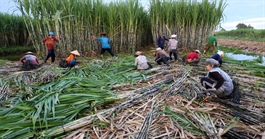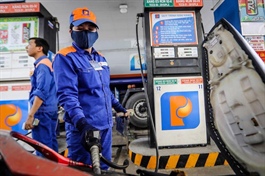EU may be answer to shrinking bean share
EU may be answer to shrinking bean share
With Europeans seemingly loving Vietnamese coffee beans, businesses are struggling to increase exports to this important market that would bring much growth to the industry.

The joy felt after negotiating the EU-Vietnam Free Trade Agreement (EVFTA) dipped after the agreement’s entry into force when many coffee businesses began to realise the hard work they would have to put in, in order to penetrate the European market.
On an international level, the EVFTA has added a relatively large competitive advantage for Vietnamese coffee products as 93 per cent of tariff lines dropped to zero as soon as the EVFTA came into effect, and the EU committed to protect 39 geographical indications of Vietnam, such as Buon Ma Thuot Coffee.
As there is much trade competition between countries exporting coffee to the EU, the attraction of Vietnamese coffee to intra-regional consumers has also become stronger.
According to the Agency of Foreign Trade under the Ministry of Industry and Trade (MoIT), coffee has shown strong growth results in both quantity and value, especially in the second implementation year. Since August 2020, export turnover of Vietnamese coffee increased by 62.7 per cent, and Vietnam’s coffee industry has at least partially found new opportunities to increase exports to the EU.
The US Department of Agriculture (USDA) forecasted that EU coffee imports in the 2021-2022 crop year will increase by more than 1.1 million bags to 45 million bags compared to the previous crop. This number is expected to continue to increase by another million bags the following season, which would then account for around 40 per cent of the world’s imported green coffee.
The USDA also forecasts EU coffee consumption in the 2022-2023 crop to reach 42.9 million bags, up 0.6 million bags from the previous crop, the highest level in recent years. The EU’s stocks are expected to decrease by 400,000 bags to 12.4 million bags due to increased consumption.
Stricter standards on product quality, origin, and plant quarantine are also an opportunity for Vietnamese businesses to move to higher levels of production standards and meet the EU’s, which also means meeting most of the world’s quality requirements.
According to the MoIT, Vietnam holds the second position in terms of coffee exports to the EU, after Brazil, which also has an FTA with the EU. But Vietnam’s coffee market share in recent years has gradually decreased from 9. 7 per cent in 2017 to only 6.2 per cent in 2021.
The competitiveness of Vietnamese coffee, according to the Revealed Comparative Advantage Index, is only average compared to the world’s other coffee powers. Vietnam’s raw coffee still competes mainly on price and has a low value compared to competitors.
Increasing coffee exports to the EU is still possible, provided that Vietnamese producers invest more efforts into quality than currently. Like other FTAs, the EVFTA provides special support for exports in the coffee production chain.
According to the Vietnam Coffee and Cocoa Association, only five foreign-invested businesses account for almost the entire export market of deep-processed coffee. Among them, Nestlé’s total investment value in Vietnam was nearly $730 million in 2021. As foreign-backed firms are financially and technologically stronger and are not bound by foreign currency borrowing conditions, the chances of domestic exporters to the EU remain limited.
Although the output is large, Vietnamese coffee enterprises still export mainly raw coffee, aka green coffee, to the EU. However in 2021, exports to the EU were made up mainly of unroasted and decaffeinated coffee, according to the MoIT.
Dr. Arjen Roem, vice president of the Food, Agri, and Aqua Business Sector Committee through the European Chamber of Commerce in Vietnam, said, “The EU is concerned with the clarity, transparency, and accuracy of certifications on the quality of Vietnamese agricultural products exported to the bloc.”
Roem added, “The EU constantly updates and intensifies the application of sanitary and quarantine measures on imported agricultural products. For instance in May, the bloc issued Regulation No.2022/741 on strengthening the control of antibiotics and pesticide residues on products of plant origin and animals.”
Thai Nhu Hiep, director of Vinh Hiep Co., Ltd. in the Central Highlands province of Gia Lai, noticed that the level of strictness on the environment, pesticide residues, people, traceability, and geographical indications are rising continuously as the EU is involved in more and more FTAs. “This means that businesses have to pay more for compliance. We annually export about 70 tonnes of coffee to the world market, of which the EU accounts for 60 per cent,” Hiep explained.
Compliance with the rules of origin, Hiep added, “is a big difficulty for businesses that want to take advantage of the benefits of the EVFTA when exporting coffee to the EU.” Currently, the EU has strict regulations on minimum domestic origin or maximum non-EU origin materials. For example, green coffee exported to the EU under the EVFTA’s principles must meet the rules of pure origin, which means all coffee must come from raw material areas in Vietnam.
Hence, the EVFTA is not a universal key as one thing has not changed: The EU still attaches great importance to the requirements for product quality, even or especially when there is an FTA.



























